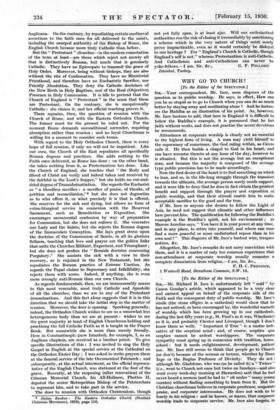WHY GO TO CHURCH?
[To the Editor of the SPECTATOR.]
Sm,—Your correspondent, Mr. Ince, soon disposes of the question as to public worship. He says, in effect, How can you be so stupid as to go to Church when you can do so much better by staying away and meditating alone ? And he instan. ces the Buddha as an illustration of his point. As, however, Mr. Ince hastens to add, that here in England it is difficult to follow the Buddha's example, it is presumed that he has faith without works, and does not practise the secret devotions he recommends.
Attendance at corporate worship is clearly not an essential to the highest form of living. A man may yield himself to the supremacy of conscience, the God ruling within, as Cicero calls it. He then builds a chapel to God in his heart, and can have recourse thereto at any hour of the day, however he is situated. But this is not the average but an exceptional man, and because the majority is composed of the average type public provision has to be made accordingly.
Now the first desire of the heart is to find something on which to lean, and so, in the life-long struggle through the transient towards the ultimate, the average person sorely needs support, and it were idle to deny that he does in fact obtain the greatest benefit and support through the prayer and exposition of public worship, and that their stimuli enable him to make acceptable sacrifice to the good and the true.
If Mr. Ince or anyone else desires to follow the Light of Asia, he need not suggest that climatic and other influences here prevent him. The qualification for following the Buddha's example is the Buddha's spirit, not his environment ; as Marcus Aurelius says, " You have it in your power at any time, and in any place, to retire into yourself, and where- can man find a more peaceful or more undisturbed repose than in his own soul ? " This disposes of Mr. Ince's barbed wire, trespass notices, &c.
Altogether, Mr. Ince's remarks do not carry conviction with them, and it is a matter of only too common experience that non-attendance at corporate worship usually connotes a complete dissociation from religion.—I am, Sir, &c.,










































 Previous page
Previous page